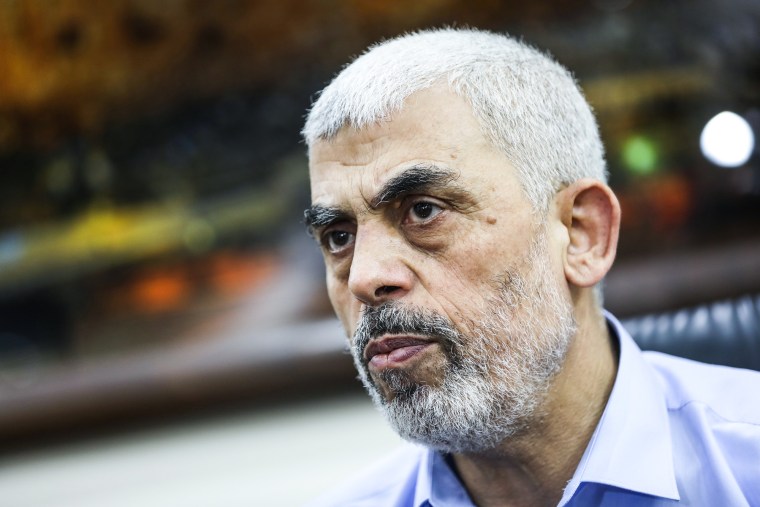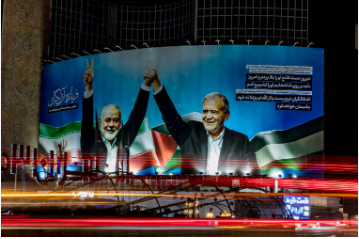Following the terror assaults on October 7, a senior Hamas official told NBC News on Wednesday that the terrorist group has been let down by its Arab neighbors. This was the day after Iran started strikes against Israel.
Dr. Basem Naim stated that Hamas was “disappointed by the reaction of the region, of the countries in the region” in an interview conducted in Doha, the capital of Qatar, where a portion of the group’s political branch is situated.
He said that Iran “was maybe the only country regarding supporting the resistance,” despite the fact that some of them had provided financial and political assistance to the organization.

He went on to say that Yahya Sinwar, the purported architect of the assaults on October 7, is still alive and still in contact with Hamas leadership and its ground soldiers.
The Revolutionary Guard Corps of Iran stated in a statement that the strikes on Israel on Wednesday were a reaction to the Israeli bombing that killed Hamas’ senior head in Tehran last week and the death of Hassan Nasrallah, the leader of Hezbollah, last week.
Shortly after taking part in President Masoud Pezeshkian’s inauguration ceremony, Ismail Haniyeh was assassinated in an explosion at his home in the Iranian capital. Israel, which was held accountable for the attack that claimed the life of Haniyeh’s bodyguard, has not acknowledged its involvement in the detonation. It is unusual for Israel to take accountability for such actions.
On Wednesday, Pezeshkian went to Doha for private discussions with the Qatari authorities. He is scheduled to attend an Asia Cooperation Dialogue conference as well.
“We also desire peace and security. Iran’s Student News Network reported Pezeshkian as stating, “It was Israel that killed Haniyeh in Tehran.” Pezeshkian was speaking upon his arrival in Qatar. “If we do nothing, there will be peace in Gaza in a week, according to Europeans and the United States.” While we waited for them to stop murdering, they kept doing so.
Prior to serving as Gaza’s health minister and then minister for sports, Naim received his medical training. He added he was unsure if Pezeshkian would meet with Hamas leaders while in the nation. Iran, according to him, is “an independent state” with “own interests.” Iran is “calculating very well what to do and what not to do,” he continued.
Following Haniyeh’s passing, Sinwar assumed leadership of Hamas’ political wing. According to him, the militant organization was “still alive” and “still in control,” and he remained in frequent contact with its members both inside and outside of the Gaza Strip.

In the immediate wake of the Oct. 7 bombings, Sinwar was called a “dead man walking” by the Israeli military, who also accused him of organizing and supervising the attacks.
On the bloodiest day in Israeli history, around 1,200 people lost their lives and over 240 were taken prisoner. Since then, more than 41,000 Palestinians have died as a result of Israel’s military onslaught in the Gaza Strip, according to enclave health authorities.
However, the elusive commander has managed to elude Israel’s military and intelligence agencies as the first anniversary of those strikes draws near. This is probably because he has been moving about and changing sites to avoid being discovered in the network of tunnels beneath Gaza.
The Israeli military claims that the 61-year-old was last seen in a 42-second video that was captured three days after the strike and showed him and his family running into a tunnel in southern Gaza.
Furthermore, Naim maintained that Mohammed Deif, the commander of Hamas’ military arm, Al-Qassam Brigades, was still alive. In July, Israel declared his death.
“Kill this leader or the other leader, or attack somewhere here or there, but you don’t solve the problem that there is a people and occupation who are looking for their freedom, dignity, and independence,” Naim said, referring to Israel.
He stated that the overwhelming majority of Palestinians continued to support “their right to fight, to resist, to struggle for their freedom and dignity.”
“They might pay a very high price, including their own life,” he said, referring to the present Hamas leadership, which includes himself.






